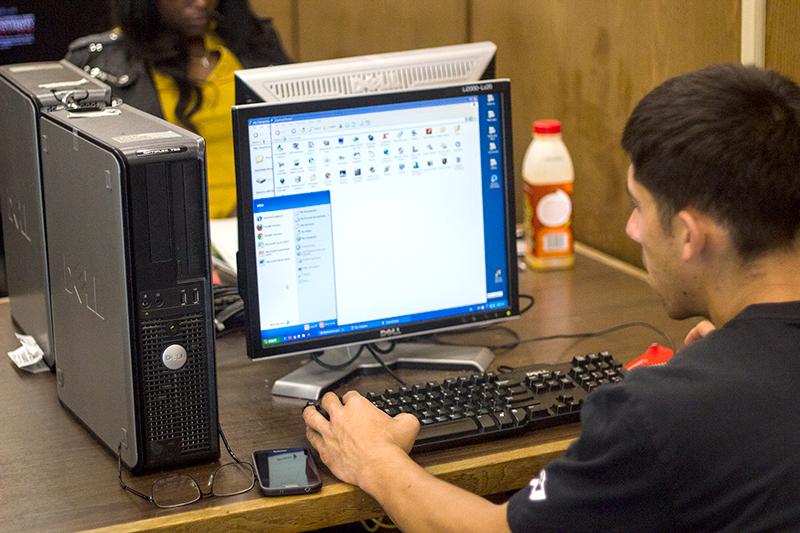Should professors ban laptops?
February 14, 2018
For years, college students have been using their laptops in class during lectures and class discussions. Laptops aid in note taking, assignments, projects and getting a headstart on the workload. Ultimately, laptops should be banned in college classrooms.
What happens to the students who don’t utilize their time diligently and are just surfing the web during class time? Their time is wasted. Teachers are not required to walk around and check what everyone is doing on their laptop. Laptop use is pretty much a free for all in college classrooms.
I am personally guilty of not utilizing my classroom time diligently. There have been times when I am in a lecture with my laptop out and pretending to pay attention. Instead, I am booking a flight or googling random subjects on the web. Do not try this yourself, make sure you pay attention in class.
With the vastly growing world of technology and social media, millions of people around the world are constantly distracted by their electronic devices and not living or learning in the moment. While electronics and the media are taking over the world, many students are not learning in the classroom because of constant distractions brought to them by their mobile device and laptop use in the classroom.
Many professors have created their own ban on electronics for their classrooms because people engage in online shopping, social media or just flat out not paying attention. The main dilemma is that many students depend on their laptops in classrooms to help them take notes and learn the material faster, but are they actually learning?
A 2014 study reported by Scientific American suggests that students who write out their notes on paper actually learn more. The research was conducted by Pam Mueller and Daniel Oppenheimer by using three different experiments to test out the accuracy of handwriting notes and laptop notes. Half of the students were instructed to take notes with a laptop, and the other half were instructed to write the notes out by hand. As in other studies, students who used laptops took more notes. In each study, however, those who wrote out their notes by hand had a stronger conceptual understanding and were more successful in applying and integrating the material than those who used took notes with their laptops.
In another study, Princeton University and the University of California, Los Angeles, conducted a series of experiments with randomly assigning students to either laptops or pen and paper for note-taking at a lecture. Those who had used laptops had substantially worse understanding of the lecture, as measured by a standardized test, than those who did not.
The researchers hypothesized that, because students can type faster than they can write, the lecturer’s words flowed right to the students’ typing fingers without stopping in their brains for substantive processing. Students writing by hand had to process and condense the spoken material simply to enable their pens to keep up with the lecture. The notes of the laptop users more closely resembled transcripts than lecture summaries.
Students retain more knowledge when they take notes by hand. Computers cause a distraction in the classroom. When students aren’t utilizing their laptops, others may become nosey and look over their shoulder. This tends to cause a distraction to the entire classroom.
Casey Beck, communications professor at Cal State East Bay has installed a laptop ban in one of her classes because students were constantly distracted and chatting on their devices during a film viewing.
Beck told The Pioneer, “In an ideal world, laptops would definitely enhance the learning experience. They enable students to immediately look up answers to questions that you may have and quickly write notes and thoughts about the topic at hand. However, you also have continuous and immediate access to all of your friends and, in fact, the entire world via the internet. There is an art to sitting, listening, taking notes and engaging as a college student that is unfortunately lost when the pull to look up your dinner options, comment on a friend’s timeline, or respond to an email about a potential job are just a click away.”
On the other hand, laptops can be beneficial to different people who need assistance in note taking or understanding the material that is being delivered in the classroom. Oftentimes, people depend on their electronics to take notes since they don’t like writing notes by hand. Laptops have many good uses and can help enhance the learning experience by allowing students to search up terms that they may not know to have a better understanding of the material.
With this stance, professors should avoid banning laptop use in college classes because the student is only wasting their own time, money and ability to learn if not utilizing their classroom time effectively. As a college professor their job is teach, give necessary knowledge to students and to help them with their work if any questions arise. If the student wishes to ignore the lecture or becomes too caught up in their own world within the realm of their laptop, that is nobody’s fault but the student’s. Students should be held accountable for their own actions and decisions whether that be paying attention in class or deciding to surf the web instead. Their grade, money and time is being wasted and the teacher should not have to worry about that.
There are pros and cons to both options when discussing the option of banning laptop use in class or allowing students to make their own decision. Whether you agree or not, teaching to a room full of distracted people not only distracts others but isn’t fair to those individuals who want to learn. If a professor were to implement a ban in their classroom to help students learn more effectively than they can honor their own policy. Universities may see a progression of overall highly competent, literate and critical thinkers as a result of organically teaching without the distraction of electronics in the classroom.









